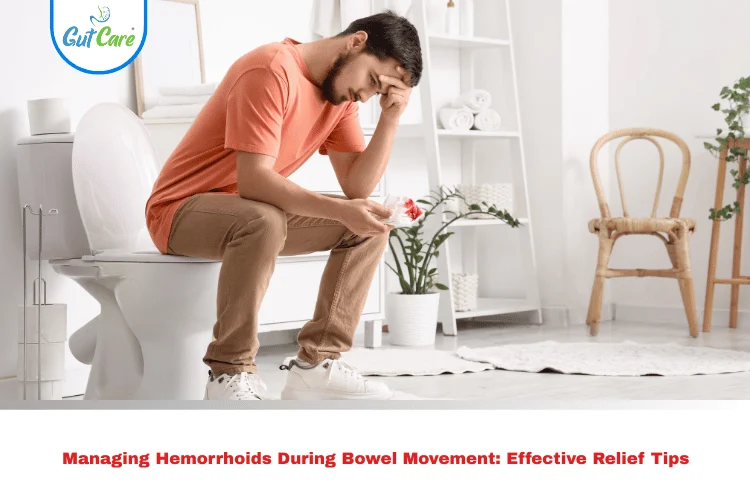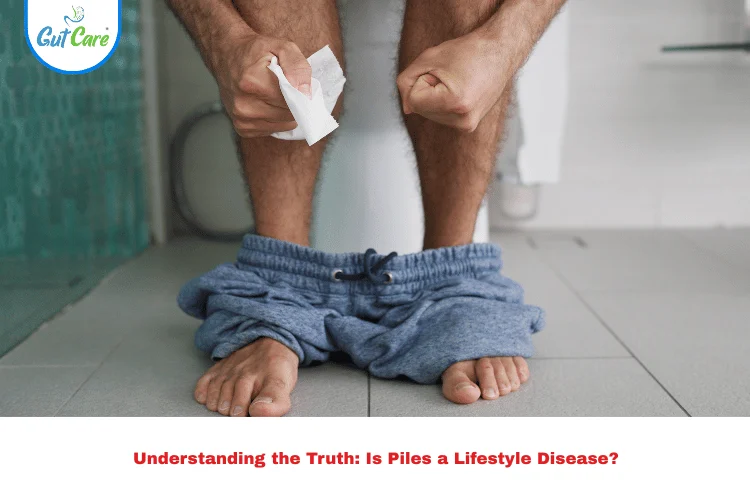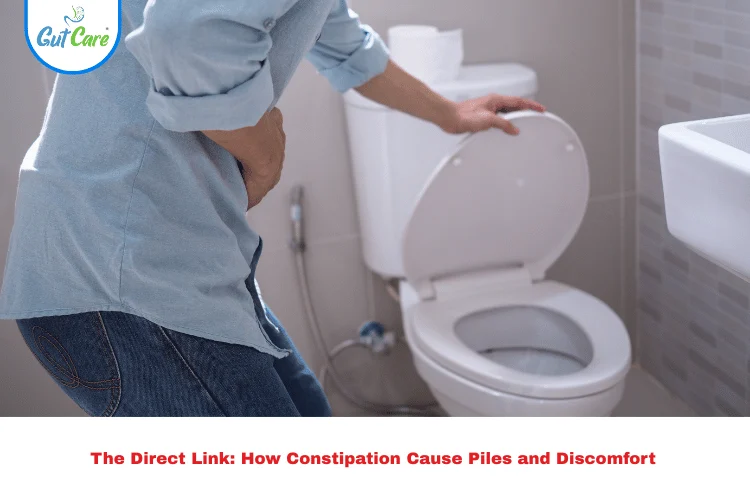Piles in Young Adults are becoming an increasingly common concern today. The perception that piles (hemorrhoids) only affect older individuals is outdated. A growing number of young adults are developing piles due to changes in lifestyle, work habits, and diet. Piles are swollen veins in the lower rectum or anus that can cause pain, itching, and bleeding during bowel movements.
According to experts at Gutcare Clinics, this trend has been steadily rising among people in their 20s and 30s, primarily due to sedentary routines, irregular eating patterns, and increased stress levels. Dr. Yuvrajsingh Gehlot, a leading Colorectal Surgeon and Gastroenterologist at Gutcare Clinics, emphasizes that early awareness and timely treatment play a crucial role in preventing complications and ensuring long-term relief.
Understanding why this condition is becoming more common in young adults is essential for effective prevention, diagnosis, and timely care.
Get relief fast—visit Gutcare Clinics today!
Understanding Piles in Young Adults
Piles in Young Adults refer to swollen veins in the lower rectum or anus that cause discomfort, pain, or bleeding during bowel movements. Many young people mistake these symptoms for minor digestive issues and delay proper diagnosis. At Gutcare Clinics, expert specialists focus on piles understanding through advanced diagnostics and personalized care plans.
This condition often develops due to a mix of factors such as poor diet, lack of physical activity, and increased stress. When ignored, it can progress and impact daily life but with the right care, it’s entirely treatable.
Why Are Piles Increasing Among Young Adults?
Piles were once associated mainly with aging and chronic constipation. However, modern habits have reshaped this picture. With more young professionals working long hours at desks, relying on processed food, and leading sedentary lifestyles, the risk factors for piles have dramatically increased.
According to experts at Gutcare Clinics, the rise in cases among young people is directly linked to preventable behaviors meaning awareness and early intervention can make a big difference.
1. Prolonged Sitting and Sedentary Lifestyle
One of the leading causes of piles in young adults is prolonged sitting. Whether working on laptops for hours, binge-watching shows, or gaming, long sitting sessions reduce blood flow to the rectal area. This leads to vein pressure buildup, eventually causing piles.
At Gutcare Clinics, doctors often emphasize the importance of taking short breaks every 45–60 minutes, stretching, and adding light physical activity to daily routines to improve circulation and digestion.
2. Low-Fiber Diet and Poor Eating Habits
Modern diets filled with refined carbs, fast food, and sugary beverages are another hidden trigger. Low-fiber foods make stools harder to pass, leading to constipation and straining during bowel movements the main cause of piles.
Smart Gut Tip:
Increase your intake of fiber-rich foods like fruits, vegetables, oats, and whole grains. Drink plenty of water throughout the day to support smooth digestion.
At Gutcare Clinics, customized diet plans are recommended for patients to improve gut health and prevent recurrence of piles.
3. Lack of Physical Exercise
Physical inactivity weakens the body’s metabolism and affects bowel movement regularity. Young adults often skip workouts due to busy schedules, but this inactivity can slow down digestion and increase pressure in the rectal veins.
Regular exercise even simple walking or yoga helps maintain a healthy digestive system and reduces the risk of constipation-related piles.
4. Excessive Use of Gadgets During Toilet Time
This is one of the most overlooked but common causes among youth today. Spending long periods on the toilet while scrolling through social media increases pressure on the anal veins, leading to inflammation and piles.
Doctors at Gutcare Clinics strongly advise against using mobile phones in the restroom, as it promotes longer sitting and unnecessary straining.
5. Stress and Irregular Bowel Habits
Stress can affect the gut-brain connection, altering bowel movement patterns. Young adults facing academic or work pressure often ignore the urge to pass stool or delay it, which can harden stools and increase strain later.
Mindful routines, adequate sleep, and hydration can help manage stress and improve bowel regularity key steps in piles prevention.
6. Unhealthy Weight and Obesity
Excess body weight increases pressure on pelvic veins, making young adults more susceptible to hemorrhoids. The growing trend of poor dietary choices and lack of exercise has led to higher obesity rates, especially in urban youth.
Gutcare Clinics focuses on a holistic approach to weight management and digestive health, helping patients achieve long-term relief through guided lifestyle modifications.
7. Ignoring Early Symptoms
Many young adults dismiss symptoms like minor bleeding, itching, or pain, assuming it’s temporary. But untreated piles can progress to severe discomfort and even require surgical intervention.
Common Early Signs Include:
- Bright red blood after bowel movements
- Itching or irritation around the anus
- Pain or swelling near the rectal area
- A feeling of incomplete evacuation
At the first sign of these symptoms, consulting a Piles Specialist at Gutcare Clinics can help with timely diagnosis and treatment before the condition worsens.
Preventing Piles: Simple Lifestyle Adjustments
Preventing piles doesn’t require drastic measures — small, consistent habits can make a significant difference.
Tips for Young Adults:
- Eat a balanced, fiber-rich diet daily.
- Stay hydrated with at least 2–3 liters of water.
- Avoid sitting for long stretches; stand or move frequently.
- Exercise at least 30 minutes a day.
- Respond promptly to bowel urges.
- Avoid straining or sitting too long on the toilet.
- Manage stress with yoga, breathing exercises, or meditation.
The gastro specialists at Gutcare Clinics guide patients with personalized plans that include diet, lifestyle, and medical advice for total digestive well-being.
Advanced Piles Treatment at Gutcare Clinics
When lifestyle changes alone aren’t enough, modern medical treatments offer quick and effective relief for Piles in Young Adults. Gutcare Clinics provides advanced, minimally invasive procedures such as laser and laparoscopic treatments designed to address the specific needs of this age group.
Under the expert care of Dr. Yuvrajsingh Gehlot, known for his compassionate approach and surgical precision, patients receive comprehensive treatment from accurate diagnosis to full recovery ensuring comfort, safety, and long-term relief.
When to Consult a Specialist
If symptoms persist for more than a few days or interfere with your daily activities, consulting a colorectal surgeon is crucial. Ignoring Piles in Young Adults can lead to chronic pain and complications.
Dr. Yuvrajsingh Gehlot at Gutcare Clinics emphasizes early diagnosis and proper treatment to ensure a comfortable and fast recovery. The clinic is trusted across Bangalore for offering safe and effective hernia repair and expert care in colorectal and digestive health.
Conclusion
Piles in Young Adults often stem from modern lifestyle choices long sitting hours, poor diet, and lack of movement. However, with timely diagnosis, proper treatment, and healthy habits, complete recovery is possible. At Gutcare Clinics, patients receive comprehensive care from Dr. Yuvrajsingh Gehlot, ensuring comfort, safety, and lasting relief.
If you’re experiencing symptoms, don’t ignore them reach out to Gutcare Clinics today for expert guidance and personalized treatment to restore your digestive wellness.
FAQs on Piles in Young Adults
1. Is it normal to get piles in your 20s?
Yes, it’s becoming common due to sedentary habits, poor diet, and stress. Dr. Yuvrajsingh Gehlot at Gutcare Clinics explains that early lifestyle changes can effectively prevent piles in young adults.
2. How to get rid of piles permanently?
Mild cases improve with diet and lifestyle changes, while advanced piles may need laser treatment. Gutcare Clinics, led by Dr. Yuvrajsingh Gehlot, offers advanced colorectal care for lasting relief.
3. Which food should be avoided in piles?
Avoid spicy, oily, and processed foods that worsen constipation. Dr. Yuvrajsingh Gehlot at Gutcare Clinics recommends a fiber-rich diet for smooth bowel movements and faster recovery.
4. How do I know if I have piles?
Common signs include bleeding, itching, and pain during bowel movements. Gutcare Clinics and Dr. Yuvrajsingh Gehlot advise prompt consultation for accurate diagnosis and early treatment.
5. Can lifestyle changes cure Piles in Young Adults naturally?
Yes. Regular exercise, a balanced diet, and proper hydration can ease symptoms and prevent recurrence when combined with professional care.




